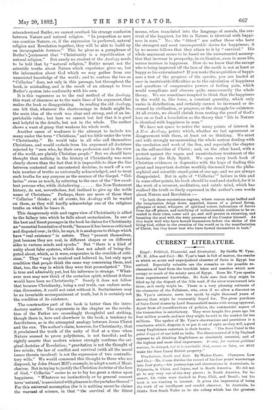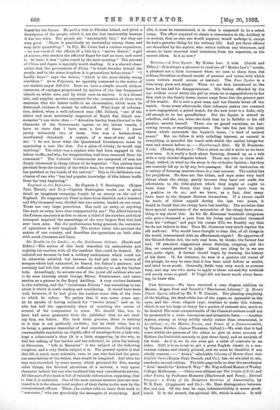Wanderings, South and East. By Walter Coote. (Sampson Low and
Co.)—Mr. Coote divides the record of his four years' wanderings into four parts,—his joarneyings and observations in Australasia, in Polynesia, in China and Japan, and in South America. He did not go to any very out-of-the-way places ; in South America, for in- stance, his visits were limited to Peru, Chili, and Brazil ; but his book is not wanting in interest. It gives the impression of being the work of an intelligent and candid observer. In Australia, he thinks New South Wales to be the colony which has the greatest hopes for the future. He paid a visit to Pitcairn Island, and gives a description of the people, which is not the less trustworthy because it has two sides. The people are " incorrigibly lazy," but they are very good. " There is practically no immorality among them, and very little quarrelling." In Fiji, Mr. Coots had a carious experience, —he was cured of the effects of a bite by a " native doctor," a girl of sixteen, who stroked the affected finger for half an hour, and cured it. At least, it was " quite cured by the next morning." The account of China and Japan is specially worth reading. It is a shrewd obser- vation that the government of China "is whole decades behind the people, and in the sister kingdom it is generations before them." "I hardly know," says the writer, "which is the more fatally wrong condition." As to Polynesia, we specially commend to the notice of our readers pages 208-214. Here we have a simple record, without comment, of outrages perpetrated by natives of the less frequented islands on white men, and by white men on natives. It is a dismal tale, and supplies another argument for the contention of those who maintain that the labour traffic is an abomination, which must be destroyed, because it cannot be reformed. What hope of reforma- tion, indeed, when a well-informed man (Mr. Neilson, "one of the oldest and most universally respected of South Sea Island mis- sionaries") can write thus :—" Attention having been directed to the character of the Government agents on the labour vessels, I have to state that I have seen a few of them. I know pretty intimately two of them. One was a broken-down, unreformed drunkard. A captain of a man-of-war said to me, `I do not know what the Queensland Government mean by appointing a man like that. For a glass of whisky, he would sign anything.' The other was a captain who had been engaged in the labour traffic, and who, for irregularities, had been removed from his command." The Colonial Governments are composed of men too deeply interested in cheap labour to be impartial. " Ten natives have perished from the cruelty of the white man, for every white man that has perished at the hands of the natives." This is the deliberate con- clusion of one who " has had popular knowledge of this labour traffic from the very beginning."

































 Previous page
Previous page